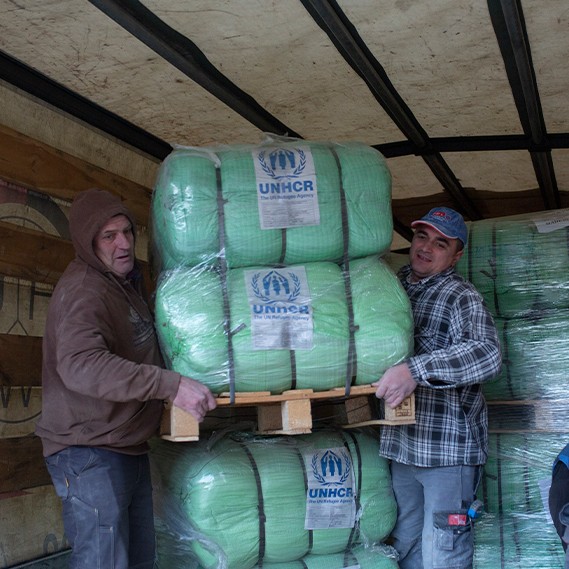Ukrainian Refugees, the Cost to Europe and the Knock-on Effect.
The crisis in Ukraine is putting heavy economic and social pressure on European Union states.
Not since the last world war has Europe experienced such a refugee crisis.
It has been estimated that hosting and integrating Ukrainian refugees could cost the EU between 30 and 40 billion Euros in the first year.[i], according to the Danish Immigration and Integration Ministry estimate for 20,000 refugees, Denmark alone could see the cost for hosting rise to 268 million Euros.[ii]

© UNHCR/Valerio Muscella
The Irish government estimates that it will cost them 2.5 billion Euros to host nearly 100,000 refugees. Due to lack of housing facilities, the government is considering a tented facility at the Defence Forces’ Gormanston camp in Co. Meath.[iii]
The European Commission has adopted a proposal for Cohesion’s Action for Refugees in Europe (CARE), allowing Member States and regions to provide emergency support to people fleeing from Ukraine. The CARE initiative will draw funding from already approved funds for Europe’s post-pandemic recovery.[iv]
Diverting COVID recovery funds will increase pressure on those EU countries whose economies are still recovering from the pandemic and are burdened with supply chain shortages and high inflation, themselves partially the result of sanctions against Russia. The expense of integrating millions of people is expected to increase and put a significant strain on housing, education and health-care systems. The large influx of workers is expected to intensify the competition on the EU job market, itself is already burdened by an estimated 13 million unemployed as of January 2022.
The large number of refugees is already pressuring the European housing market. More than half the 4.5 million Ukrainian refugees are located in Poland, which is already feeling the pressure on its housing market, where rents have increased by 20%.[v]
Claus Vistesen, chief Eurozone economist for Pantheon Macroeconomics, told the New York Times that the sudden need for more housing, fuel, food, health care services will further exacerbate supply shortages. He expects inflation in the Eurozone to increase to 7 percent, making it more difficult for the European Central Bank to balance the risks of inflation and recession.[vi]
Limited housing for refugees has forced city of Berlin officials to evict some of its Afghan refugees to make room for the ones arriving from Ukraine. The officials’ decision has led to accusations of unequal treatment.[vii] In the UK, hundreds of refugees have had to be resettled in hotels at government expense, as the host sponsors were determined to be unsuitable, some even with a criminal record.[viii]
On a related tack, the conflict is having a knock-on effect: for example, Air Serbia has received numerous fake bomb threats on their flights to Moscow, most of them originating from Ukraine.[ix] The bomb threats have spread from Air Serbia’s flights to Moscow to the airline’s offices and shopping centres in the country. Ukrainian officials accuse the airline of profiteering from the crisis and have demanded that the flights stop.[x] Serbia’s President Aleksandar Vucic stated that the threats originate from the security services of two countries, one being Ukraine, and the other an EU country, which he – diplomatically – declined to name.[xi]
Other examples of the knock-on effect are: the attack on a residential compound housing Russian journalists in Berlin, using an improvised exploding device; [xii] a car ramming the Russian embassy in Romania with one fatality, [xiii] hundreds of reported attacks on Russian-speakers in Germany; [xiv] and the recent spraying in red paint of the Russian ambassador in Poland, when he was trying to lay a wreath to the dead of the last war. Such intemperate behaviour shows that not only hybrid warfare, but violent incidents, could easily increase in European countries.
These incidents could well increase with the arrival of more refugees and the intensification of the conflict in Ukraine. Coupled with rising costs and the economic hardship caused by almost two years of the Covid phenomenon, they are likely to exert even greater pressure on the societies of EU countries.
The unequal treatment of Ukrainian refugees compared to that of refugees from other regions, particularly from the Middle East, is clearly a highly sensitive issue: granting a three-year stay in the EU for Ukrainians has already caused a backlash from various NGO’s and social activists, who are claiming that the refugees’ skin colour is a determining factor for preferential treatment. Some are going so far as to claim that racism is prevalent in the way that the conflict is being covered by international media and in the policies of countries where immigrants are seeking refuge. [xv]
According to Hanne Beirens, Europe director of the Brussels-based Migration Policy Institute, in an interview with NPR, with any refugee crisis there is a particular life cycle. It is very strong at the beginning, but at some point, frustration sets in: the competition for access to school-places, social housing and medical services can seriously undermine the much-vaunted EU tolerance and solidarity.[xvi] In that connexion, it is hardly surprising that even President Macron has stated that it will take decades for Ukraine to join the EU.[xvii] Many young Ukrainians have wished to get into the EU for a long time, and a certain number might well be using this opportunity to escape not only the military draft, but the lack of employment opportunities in Ukraine. Some would argue that they see this crisis as an economic opportunity.
When the hysteria in Europe and NATO dies down, it is economics that will determine matters.
[i] https://www.bruegel.org/2022/04/bold-european-union-action-is-needed-to-support-ukrainian-refugees/
https://www.nytimes.com/2022/03/16/business/economy/ukraine-refugee-crisis-europe-economy.html
[ii] https://www.euractiv.com/section/politics/short_news/ukrainian-refugees-could-cost-denmark-over-e268-million-in-2022/
[iii] https://www.schengenvisainfo.com/news/ireland-housing-for-ukrainian-refugees-next-year-will-cost-e2-5-billion/
[iv] https://ec.europa.eu/commission/presscorner/detail/en/ip_22_1607
https://www.consilium.europa.eu/en/press/press-releases/2022/04/12/ukraine-increased-financing/
[v] https://www.reuters.com/business/finance/ukrainian-refugee-crisis-seen-pressuring-europes-housing-market-2022-04-12/
[vi] https://www.nytimes.com/2022/03/16/business/economy/ukraine-refugee-crisis-europe-economy.html
[vii] https://foreignpolicy.com/2022/04/20/germany-refugee-policy-afghanistan-ukraine/
[viii] https://www.theguardian.com/uk-news/2022/may/08/hundreds-of-ukrainian-refugees-removed-from-uks-unsuitable-housing-sponsors
[ix] https://rs.n1info.com/vesti/vojinovic-dve-dojave-u-jucerasnjem-danu-o-bombi-na-letu-beograd-moskva/
[x] https://www.slobodnaevropa.org/a/srbija-rusija-sankcije-avioni/31749775.html
[xi] https://www.reuters.com/world/europe/serbia-accuses-ukraine-unnamed-eu-country-air-serbia-bomb-hoaxes-2022-04-18/
[xii] https://tass.com/emergencies/1448243?ysclid=l2zw9dp27d&utm_source=yandex.com&utm_medium=organic&utm_campaign=yandex.com&utm_referrer=yandex.com
[xiii] https://www.euronews.com/2022/04/06/man-dies-in-fire-after-car-crashes-into-russian-embassy-gates-in-romania
[xiv] https://www.breitbart.com/europe/2022/03/14/ukraine-crisis-hundreds-of-criminal-attacks-on-russians-in-germany/
[xv] https://www.independent.co.uk/news/world/europe/ukraine-refugees-response-europe-racist-b2024840.html
[xvi] https://www.npr.org/2022/04/03/1090609713/how-a-massive-influx-of-ukraine-refugees-could-change-europe
